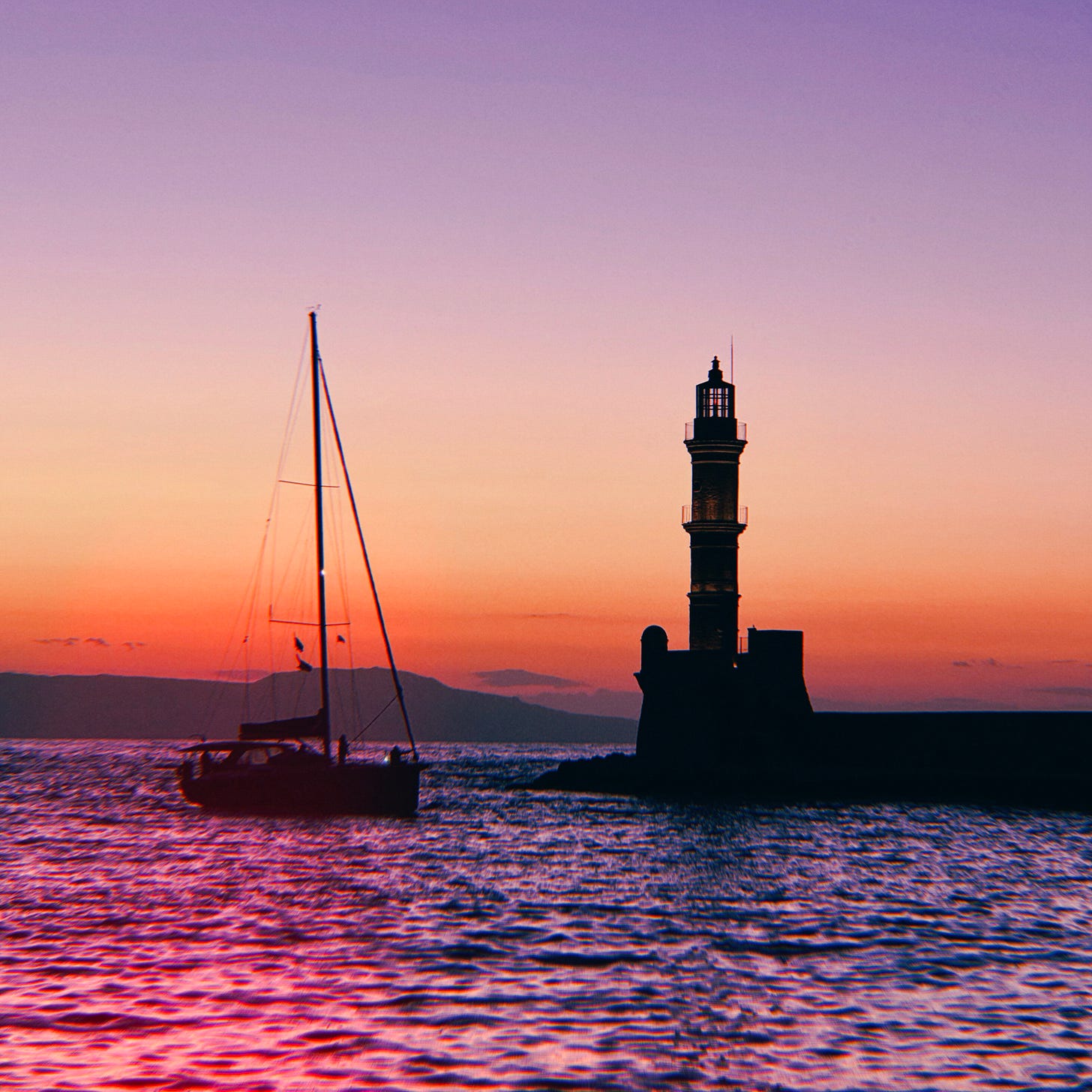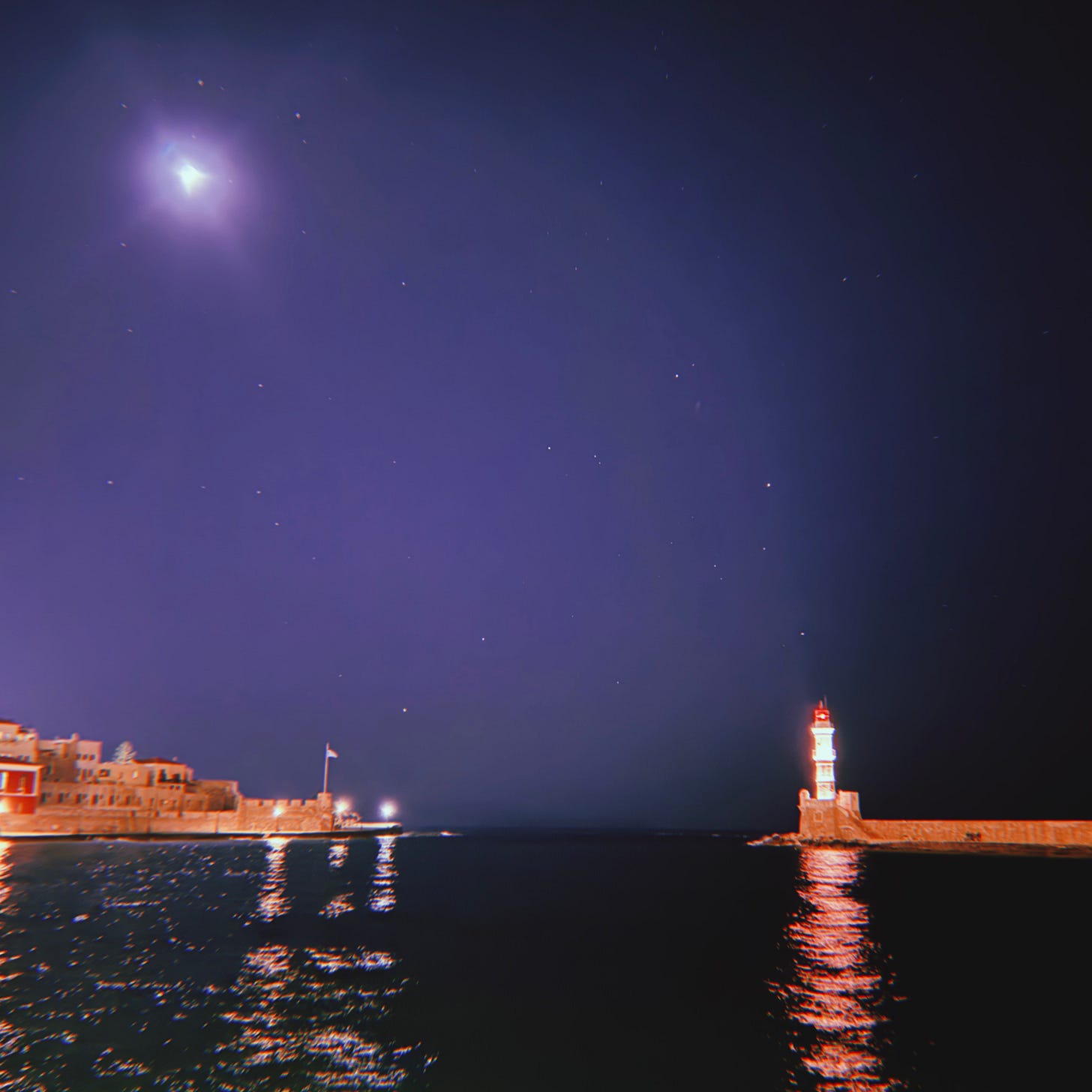An Old Venetian Harbor and a Wink from the Universe
Notes on intuition and resilience from the island of Crete
Still drenched from a wave of life changes, I’d been struggling with motivation, direction, and overwhelm for months. So, when my mom suggested we plan a trip to Greece, I didn’t hesitate.
Being in motion always helps me shake off negative feelings, whether by plane, train, or on foot, and I was due for a dose of Mediterranean atmosphere—a soul vitamin that I find particularly healing.
I’d been losing steam for music, my primary passion in life. Several original songs had been knocking around my consciousness for months, each one accompanied by a growing sense of shame for every day it went unfinished.
This wasn’t the first time.
The constant hustle of self-employment was wearing me down as well, which feels almost embarrassing to admit when your entire identity is built around following your dreams and forging your own path. Getting enough work was tough, but pushing through client fluctuations, evolving tools, and shifting earning potential in the age of AI had been deeply disorienting.
I wrote more about this topic here.
I’ve never been very good at putting my feelings aside to “get the job done" (except in emergencies), so all of this heavy energy, unrealized creativity, and self-judgment piled up—until it was utterly crushing.
Something had to give.
Following My Intuition
Sometimes, a change of scenery is a lifeline.
I believe in intentional magic—deliberately creating experiences that feel purposeful, magical, uplifting, or otherwise inspiring. It’s not always easy to do when you’re in a slump, but that’s exactly when it matters most.
Sometimes, creating that magic means trusting your gut and taking a leap, even when you’re feeling stuck.
Since I wasn’t meeting up with my mom and our family friend until a few days later in Santorini, I decided to follow my intuition and book some time to myself on the island of Crete.
Crete: A Land of Complexity and Paradox
Although I’ve been to Greece many times, I’d never spent time in Crete. My only major association with the island was from Homer’s epic poem The Odyssey.
Throughout his journey, Odysseus often claims to be from Crete when telling false stories to protect his identity—a choice that mirrors Crete’s own complex nature as both a place of civilization and chaos. To the ancient Greeks, Crete was both revered and feared. It marked the dawn of Western European civilization, yet it was also cloaked in mystery and myth.
The second association only dawned on me after I arrived: I was reading Haruki Murakami’s novel The Wind-Up Bird Chronicle at the time, and it hit me that one of the characters, Creta Kano, was named after the island.
In the book, Creta is portrayed as a complex, enigmatic figure shaped by profound trauma. She undergoes a journey of transformation, ultimately reclaiming her sense of identity and agency despite the darkness of her past.
As I learned more about Crete, I began to understand its history as a crossroads of ancient artistry and myth. As the largest of the Greek islands, it’s known as the cradle of Europe’s earliest civilization—the Minoans—who left behind intricate frescoes, advanced architecture, and symbols that inspired Greek mythology.
It felt fitting to immerse myself in a place where creativity had flourished for thousands of years, and where an enduring cultural presence still lingered in the air.
Chania: A Venetian Pearl
With its rich history and vibrant atmosphere, the picturesque harbor city of Chania seemed like a good place to stay.
The Venetian harbor was breathtaking, with its iconic lighthouse standing watch over the azure waters. Originally built during the Venetian occupation in the 16th century, it’s one of the oldest lighthouses in the world—a symbol of guidance and endurance.
What Are the Chances?
After a full day of exploration, I returned to the harbor exhausted and in need of rest and reflection. I made my way to a restaurant with an outdoor terrace overlooking the water and settled in with a view of the lighthouse just as the sun was setting.
The music playing in the background was both relaxing and pulsing with life. I’ve noticed that both Greece and Türkiye share a musical vibe characterized by percussive rhythms and relaxing soundscapes that hover somewhere between 100-110 BPM.
This tempo range sits just above the average adult resting heart rate of 60-100 BPM, giving it an energized yet steady quality that mirrors the body’s natural rhythm.
I was soaking in the sunset when something unexpected happened.
One of my own songs started playing.
I froze for a moment, unsure if I was imagining things. Then I realized: This was the first time I’d ever heard my music completely randomly, in the wild. In the year and a half since the song's release, I’d occasionally heard it at a live show (when I knew it would be played), on a Spotify playlist or DJ mix, but never like this.
Never out in public, by chance.
Sitting by the harbor and staring at the sun, the salty air filled with my own words, my own voice—I couldn’t help but feel like the universe was winking at me, and reminding me of who I was and what I’m here for.
My waiter was slightly confused when I exclaimed, “This is my song!” He must have thought I meant that I liked the song, so I told him that I wrote and sang it. I had to tell someone.
(I’m still not sure if he believed me or not, but it was an unforgettable moment anyway.)
When I spoke to the DJ, he mentioned that he regularly plays the song at that venue. Hearing that was surreal—a strange, beautiful affirmation that my work can find a home even when I feel unmoored.
Lost & Found
All of this felt like a sign that, despite the doubt and uncertainty, my creative work had a life of its own—moving, traveling, and finding its place in the world. Even when I’m not sure where I belong, my work can somehow find the places it belongs (when I’m not looking, of course).
I was already glad that I had come to Chania, but now it felt certain: I was exactly where I was supposed to be.
My intuition came through for me, again. And it felt like the universe was rewarding me for trusting that instinct.
In a way, both Creta Kano and Odysseus represent the same duality we all face: the journey home (to oneself or a place) while carrying the weight of past and present struggles. Standing by the harbor that evening, I felt connected to that idea—of being both lost and found, of bravely holding pain while still pushing forward.
Not all of our struggles will be resolved before we can progress. Sometimes we carry them with us, finding strength in the journey—in the resilience, and in the process of building ourselves back up.
You don’t have to wait for everything to make sense before taking the next step; trust that movement itself can bring clarity and meaning.
Like the lighthouse at Chania’s harbor, creativity endures—offering light and direction when everything else feels uncertain. And sometimes, when you simply follow your intuition, you end up exactly where you’re meant to be.





